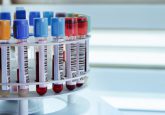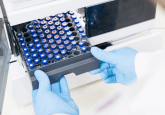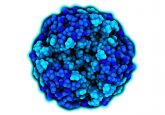New integrated smartphone device may be applied in cancer diagnostics

Investigators at Massachusetts General Hospital (MA, USA) have reported a generic approach to enable molecular diagnostics on smartphones, which may have potential use for the diagnosis of cancer in in geographically and/or socioeconomically limited settings.
The device itself features an imaging module with a battery-powered LED light clipped onto a standard smartphone that records high-resolution imaging data with its camera. Using digital diffraction diagnosis, otherwise known as ‘D3’, the system uses molecular-specific microbeads to generate unique diffraction patterns of so-called “blurry beads”. These are then acquired by the smartphone and processed by a remote server.
The D3 system has been applied in the screening of precancerous and cancerous cells in cervical specimens and in the detection of human papillomavirus DNA. In the study, a sample of blood or tissue was labeled with microbeads that bind to known cancer-related molecules and loaded into the D3 imaging module. The image was then recorded and the data transmitted to the server. The presence of specific molecules was detected by analyzing the diffraction patterns generated by the microbeads. The D3 assay was found to generate readouts within 45 min and demonstrated an excellent agreement with gold-standard pathology and HPV testing. Since the device is compact, easy to operate, and readily integrated with the standard, portable smartphone, the team envisages that this approach could have favorable global health applications in places where medical access is limited or where delays are often caused by limited pathology services.
“The global burden of cancer, limited access to prompt pathology services in many regions and emerging cell profiling technologies increase the need for low-cost, portable and rapid diagnostic approaches that can be delivered at the point of care,” commented Cesar Castro, co-lead author of the study. “The emerging genomic and biological data for various cancers, which can be essential to choosing the most appropriate therapy, supports the need for molecular profiling strategies that are more accessible to providers, clinical investigators and patients; and we believe the platform we have developed provides essential features at an extraordinary low cost.”
The team now intends to in investigate the D3 platform’s ability to analyze protein and DNA markers of other diseases. They will also be exploring integration of the software with larger databases, and conducting clinical studies in settings such as care-delivery sites in developing countries or rural locations.
Sources: Smartphone-based device could provide rapid, low-cost molecular tumor diagnosis; Im H, Castroa CM, Shao H et al. Digital diffraction analysis enables low-cost molecular diagnostics on a smartphone. Proc. Natl Acad. Sci. USA DOI: 10.1073/pnas.1501815112 (2015) (Epub ahead of print).




